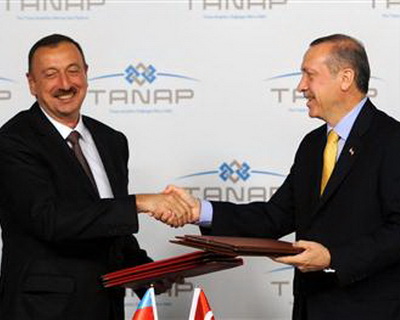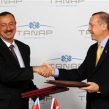
Aliyev, Erdogan Sign Inter-Governmental Agreement on Trans-Anatolia Gas Pipeline to Europe
Publication: Eurasia Daily Monitor Volume: 9 Issue: 122
By:

On June 26 in Istanbul, Azerbaijan’s and Turkey’s leaders signed the inter-governmental agreement on the Trans-Anatolia Gas Pipeline (TANAP) project. This agreement marks the start of implementing the EU-planned Southern Corridor to Europe for Caspian gas. This pipeline would run from the Georgia-Turkey border to the Turkey-EU border. This gas project’s launching is equivalent in its significance to the launching of the Baku-Tbilisi-Ceyhan oil pipeline project more than a decade ago.
Baku and Ankara signed a memorandum of understanding on the Trans-Anatolia gas pipeline project on December 26, 2011, at Baku’s initiative. Building on that, the documents just signed on June 26 include (Trend, 1News.Az, Anatolia news agency, June 26, 27):
1) the binding Inter-Governmental Agreement on TANAP, signed by President Ilham Aliyev and Prime Minister Recep Tayyip Erdogan, along with Energy Ministers Natig Aliyev and Taner Yildiz; 2) the Host Country Agreement between the Turkish government and the TANAP Project Company, signed by Minister Yildiz with Rovnag Abdullayev, president of Azerbaijan’s State Oil Company (SOCAR, the majority shareholder of the TANAP project company); and 3) a preliminary agreement between SOCAR and Turkey’s state-owned pipeline company, Botas, on organizational and technical issues related to the TANAP project.
Under these agreements, Azerbaijan, via SOCAR, shall hold 80 percent of the shares and operating rights in the project company, with options to sell minority stakes to possible new shareholders later. Botas and Turkish Petroleum shall hold 20 percent between them. The pipeline is dedicated to the use of its shareholders (current and potentially future ones) for transportation of their gas. The TANAP project company will be headquartered in the Netherlands; and the pipeline, once built in Turkey’s territory, will be subject to European Union legislation.
Construction work is expected to start in early 2014 (an adjustment to the one-year delay of Shah Deniz Phase Two of field development by the gas producers’ consortium). TANAP’s construction costs are planned at $7 billion. From that figure, $1.8 billion are to be covered by TANAP shareholders, proportionately to their stakes in the project (i.e., mainly by Azerbaijan). Most of the remainder is to be raised through bank loans. TANAP is well timed to take advantage of low-interest rates currently prevailing in Europe (an advantage that could dissipate in the event of undue delays to TANAP’s implementation).
The Trans-Anatolia pipeline is planned to carry the first Azerbaijani gas to Europe by 2018. Its gas throughput is projected at 16 billion cubic meters (bcm) annually during the first stage from 2018 onward. The line is designed for scaling its capacity upward depending on gas inflow, as follows: 23 bcm per year in the second stage by 2023, 31 bcm (equal to the Nabucco project’s primordial version) by 2026, and ultimately 60 bcm (adding pipeline strings through the same corridor), mainly contingent on gas flowing across the Caspian Sea from Turkmenistan (see below).
Of those 16 bcm annually in the first stage, six bcm are earmarked for Turkey’s internal use and ten bcm for delivery to Europe. Within Turkey, Botas will play a role in transporting the Turkish lift-off gas volumes (those volumes are mainly destined for the urban agglomerations in Turkey’s west, a highly lucrative market for Azerbaijani gas).
For its part, Baku anticipates an overall production of 50 to 55 bcm of gas annually from 2025 onward, both from Shah Deniz and the proven reserves at other fields (“non-Shah Deniz gas”). From that overall production, Baku planners can anticipate at least 25 bcm to be available for export annually by 2025 through the TANAP pipeline to Europe (1News.az, June 27).
Ankara and Baku expect British Petroleum (BP), and possibly other partners in the Shah Deniz producers’ consortium, to join the TANAP export pipeline project as minority stakeholders. Other Shah Deniz producers include Norway’s Statoil, French Total and Turkish Petroleum, which is already a minority stakeholder in TANAP (see above). Total, which is also involved in Azerbaijan’s Apsheron gas export project, might well decide to acquire a minority stake in the export pipeline to Europe.
In his speech at the agreement’s signing, Erdogan underscored TANAP’s significance to Turkmenistan, in the context of the Southern Corridor to Europe, which Erdogan said Turkey supports. Noting the pipeline’s potential to carry 30 and even 60 bcm annually in the future, Erdogan said that TANAP would enable Turkmenistan to export its gas to Europe via Azerbaijan and Turkey (Zaman, Hurriyet, June 27).
In Ashgabat, President Gurbanguly Berdimuhamedov and the Turkmen government are clearly encouraged by TANAP’s launching. As a direct response to this event, Turkmenistan is stepping up consultations with the European Commission on a trans-Caspian pipeline, and trying to accelerate construction of the feeder pipeline from Turkmenistan’s eastern gas fields to its Caspian shore.




